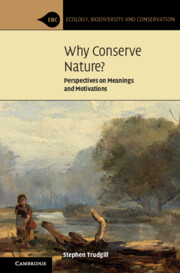Book contents
- Why Conserve Nature?
- Ecology, Biodiversity and Conservation
- Why Conserve Nature?
- Copyright page
- Dedication
- Contents
- Foreword
- Preface
- Part I The Experience of Nature
- Part II Nature Imagined
- 3 Nature in Ecological Science
- 4 Nature in Literature and Art
- Part III Nature, Self and Place
- Part IV Why Conserve Nature?
- Bibliography
- Index
3 - Nature in Ecological Science
Explanations, Emotions and Motivations
from Part II - Nature Imagined
Published online by Cambridge University Press: 03 February 2022
- Why Conserve Nature?
- Ecology, Biodiversity and Conservation
- Why Conserve Nature?
- Copyright page
- Dedication
- Contents
- Foreword
- Preface
- Part I The Experience of Nature
- Part II Nature Imagined
- 3 Nature in Ecological Science
- 4 Nature in Literature and Art
- Part III Nature, Self and Place
- Part IV Why Conserve Nature?
- Bibliography
- Index
Summary
How well do we know nature? We might start by considering the nature of our wisdom about and our intuitive understanding of nature. How far does our search for knowledge remove our intuitive knowledge? This question brings to mind the dialogue between Fuchsia and Steerpike in Mervyn Peake’s Titus Groan (Peake, [1946]1968: 274) where Fuchsia feels she doesn’t know anything about nature: “I don’t understand it. I only look at it.” Steerpike’s reply is to the effect that you must understand what you love so much: “You look as though you understand.” Fuchsia says she feels she doesn’t understand wise things and the interesting reply from Steerpike is that is that her knowledge is intuitive: “You have no need of book learning and such like. You only have to gaze at a thing to know it.” We might indeed ponder how the understanding of nature from ‘books and learning’ compares with and relates to our naïve knowing gaze – and how well they each serve us. In this chapter (Section 3.2), we enter a woodland with an ecologist – with all their books and learning – and, by contrast, in Section 5.4 we enter a woodland to gaze around without one.
- Type
- Chapter
- Information
- Why Conserve Nature?Perspectives on Meanings and Motivations, pp. 109 - 136Publisher: Cambridge University PressPrint publication year: 2022

